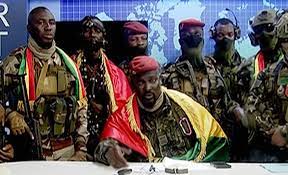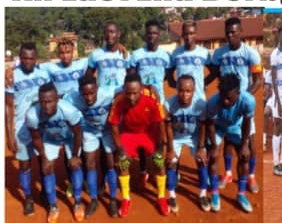By Alusine Fullah
The motive of this article is about examining the recent military coups in Africa. But, before heading to that route, the writer starts by giving you a historical background about coups in Africa. So relax and have a taste of it.
It is lucid that the primary function of the military is to protect citizens of any country from external attacks and internal revolt/ strike. The soldiers are not to rule any country because they are not train to do so. During the colonial rule, they were confined to their primary functions. In the 60s, most Africa countries gained independence. The gaining of independence catapulted an increase involvement of the military in the politics of Africa. Some of those coups are regarded as reform coups and the others were as a result of the vaulting ambition and self-interest of the military.
The first coup d’état in Africa took place in Egypt in 1952 when colonial Gamel Abdel Nasser ousted King Pharoah from power. The first coup d’état in West Africa after independence took place in Togo in January 1963. The coup was led by Sergeants Gnassingbe Eyadema and Bodjolle. The then president Sylvanus Olympio was assassinated in the coup. The coup was due to the dislike of President Olympio’s political tyranny by a group of the army.
The main motives of the coup ware ambition and personal interest of the army backed by regional and ethnic interest. This was because the coupists belonged to the Kabre ethnic group from the north and President Olympio was recruiting more soldiers from the unemployed school leavers in the south. Eyadema and his colleagues quickly handed over power to a civilian government led by Nicholas Grunitzky who was a political rival of Olympio. In January 1967, Ayadema led another coup which overthrew the government of Nicholas Grunitzky.
In Ghana, the first coup d’état took place in February in 1966 against President Kwame Nkrumah. It was led by Colonel Kotoka and Colonel Ocran Major Afrifa. They overthrew President Nkrumah who was on a visit to the far East in Ghana. The grievances of the army were due to the policy of the President of expanding and equipping the Presidential Guards who were trained by Russia. Also, the president forced some professional competent commanders to retire. So according to the coupists, the motive was to protect the army from political interference and for reform.
In Nigeria, the first coup took place in January, 1966. It was staged by Junior Officers led by Major Chukwuma Nzeogwu. This coup was inspired by self-interest and ethnicity. The Southern Officers wanted to overthrow the Northern political domination and advance the Southern political interests. Most of the coup makers were Igbos, a few were Yorubas and there was no northerner.
In Sierra Leone, the first coup took place in 1967 after the general election that year. The coup leader was David Lansana against Siaka P. Stevens. According to Brigadier Lansana, he intervened because the results of the 17th March, 1967 elections were not decisive. There was violence prior to the election, there was breakdown of law and order and during the election voting reflected ethnic loyalty. He therefore intervened in order to solve these problems. His coup was not a reform coup.
It was motivated by tribalism, regionalism and inordinate ambition of the army. The reasons he presented did not convince many people including his military boys. Therefore, his major officers led by Major A.C Blake and Major B.I Kai Samba arrested and detained him (Brigadier Lansana) together with Sir Albert Margai (the Prime Minister from 1964 to 1967). These coups makers invited Lieutenant Colonel Andrew Juxon-Smith from England to lead them. On the 23rd March 1967, the officers set up a military Junta called the National Reformation Council (N.R.C). Juxon-Smith became its chairman.
On a radio broadcast, the N.R.C promised itself to end tribalism, nepotism, corruption and to promote national unity. It called itself a caretaker government and promised to hand over power to a civilian government as quickly as possible. This second coup was a reform coup. Lieutenant Colonel Juxion Smith succeeded in setting up a Commission of Enquiry which ascertained the true winner of the March 1967 election.
Coups did not end there; guess what, on the 29th April 1992, Sierra Leone breathed on another coup. It was this coup that brought Captain Valentine E.M Stresser to power. This PC was accused of rigging elections, rampant corruption, poor conditions in the army, tribalism and the APC was also accused of staying too long in power.
On the 25th May 1997, the democratically elected government of Ahmed Tegan Kabba was overthrown by some army boys led by Coporal Gborie. They invited Lieutenant-Colonel Johnny Paul Koroma to be the chairman of their Armed Forces Revolutionary Council (AFRC) government.
On 26 July 2023, the Presidential Guard in Niger launched a coup and detained President Mohamed Bazoum and his family. Senior officers from various branches of the defense and security forces (FDS) formed a junta, named the National Council for the Safeguarding of the Homeland (CNSP), and announced the seizure of power on a televised broadcast. Public response varied, with initial demonstrations in support of Bazoum being dispersed by mutinous soldiers, followed by subsequent demonstrations in support of the CNSP. By 27 July, the Nigerien Armed Forces joined the CNSP, citing their intent to avoid lethal confrontation and to safeguard the president and his family.
The coup has largely been condemned internationally, including by key stakeholders like the United States, France, the European Union, and ECOWAS. During a summit in Nigeria’s capital Abuja, ECOWAS considered military intervention, and threatened sanctions to pressure the junta to reinstate Bazoum by giving a one-week ultimatum. In his speech on VOA, the Ivorian President, Alhassane Ouattrra said: “ECOWAS cannot accept this. This not a matter against Niger…the decision that we have made today I hope it will be implemented immediately—it is a decision of ECOWAS…all the heads of state think we have tried dialogue with the coupists of Niger. We have sent delegations to talk to them. But have failed to heed to our demands and they keeping president Bazoum as a hostage…and we cannot let this continue. We have to act…we will not accept coup d’état.
The West African Economic and Monetary Union (UEMOA) imposed immediate sanctions and froze Nigerien state assets. Burkina Faso, Guinea, and Mali have declared their support for the Nigerien junta and expressed their refusal to apply any sanctions imposed on Niger. Burkina Faso and Mali further warned in a joint statement that any military intervention in Niger was a declaration of war against the two countries. The reactions in support of Niger from the junta-led states have set the stage for a deeper divide and potential break-up of the West African bloc.
Niger represents the last of the three central Sahel states to succumb to a military coup, after Mali in 2020 and 2021, and two coups in Burkina Faso in 2022. While some interpret this event through the context of Russia’s increasing influence or its alignment with Western military training initiatives, the primary catalysts were essentially domestic in nature. The leader of the coup, General Abdourahamane Tchiani, was rumored to be on the verge of losing his position as head of the Presidential Guard – a role in which he had defended the regime against numerous attempted coups during the tenures of both former President Mahamadou Issoufou and his successor Bazoum.
The Minister of Information and Communication, Chernor Bah said on Good Morning Salone Program, 98.1 Sierra Leone always remains ready to any military assistance to the bloc of ECOWAS. He said: Sierra Leone had made a long-standing pledge to contribute troops to ECOWAS’ standing force. That pledge has not changed. We always remain whenever called upon to honor our contribution to ECOWAS with a company of troops and the necessary equipment to carry out any approved mission…as a beneficiary of ECOWAS peace and democracy intervention, we particularly understand the need to fulfill our obligation as part of the bloc..” ECOWAS intervened in Sierra Leone to help end the war but also reinstate the elected government of President Ahmad Tegan Kabbah following his ouster in a coup in 1997.
Police officers have arrested several people, including high-ranking soldiers in Sierra Leone, suspected to be planning violent attacks on citizens. This was disclosed by the police in a statement.
Yes, it did not end there (Niger). Military officers in Gabon say they have taken power and put the president, Ali Bongo Ondimba, under house arrest, as the country becomes the latest in Africa to suffer an attempted coup, only weeks after mutinous troops seized power in Niger.
A group of military personnel appeared on state television to announce they were seizing power to overturn the results of a presidential election, seeking to remove a president whose family has held power for nearly 56 years. The officers introduced themselves as members of the Committee of Transition and the Restoration of Institutions. The officers said they represented all Gabonese security and defense forces and announced the election results were cancelled; all borders were closed until further notice and state institutions dissolved.
“Today the country is undergoing a severe institutional, political, economic, and social crisis,” the officers said in a statement, saying the 26 August election lacked transparency and credibility. “In the name of the Gabonese people … we have decided to defend the peace by putting an end to the current regime.”
Back home, Sierra Leone has suspected coup attempt. The Sierra Leone Police on their press released that was dated on the 31st July, 2023 informed the general public that certain individuals including senior military officers are undermining the peace and tranquility of the state. The release states: “The general public is hereby informed that the security sector has been following intelligence regarding the activities of certain individuals, including senior military officers working to undermine the peace and tranquility of the state and unleash violence on peaceful citizens of Sierra Leone…”
Military coups have become a regular occurrence in Africa for decades since the continent gained independence in the 1950’s. African tensions and military coups cause various impacts on the national economies of involved countries. In some cases, it may spill over into the wider region and the continent and even beyond to hit the global economy. Africa has more attempted coups than any other continent. Studies identified more than 200 attempted coups in Africa since the late 1950’s. This year, Niger and Gabon were hit by military coups. In general, West and central African countries have the most military coups because of racial and ethnic rifts that provide a favorable environment, as well as the fragile security and political structure of involved states. However, despite the massive number of coups occurred, about half of the attempted coups failed.













